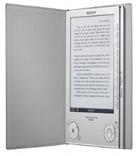
For many of us, printed books are satisfying in ways beyond the words they contain. Billions of printed books have been published, read and saved in the 600 years since movable type was invented, so why mess with a good things?
Sony Electronics is doing just that, betting that readers will be won over by the convenience of readability of its new electronic book devices. Sony's reader, the PRS-505, can hold 160 books in its fixed memory, enough to line the shelves on a good-sized wall in the average American home. The $299 device is about the size of a paperback book, but a half-inch thick and weighs less than a pound.
The Sony book reader is revolutionary not only in its storage capacity. The font(字體) is highly readable and adjustable by size. Unlike laptop computers, you can put the Sony in your purse, read it in direct sunlight and even bookmark the pages. And you can connect it to your PC to download books.
Surprisingly, though the reader has liberated the book from paper, electronic books aren't always a bargain. For example, David Baldacci's "Stone Cold" download retails(零售) for $15.19 at the Sony site, while Amazon(卓越網(wǎng)) will deliver a hard copy to your mailbox for $16.19.
The Sony reader also lets you store and play or display music. So what's not to like about the Sony? Well, for many bibliophiles, a lot. Book lovers like to have, hold and keep their volumes, which don't need charging. You can write notes in the margins, and enjoy the ambience they provide on your book shelves.
The need for electronic reading devices is likely to grow as more people worried about the billions of tons of paper used for printed material. Many believe the time will come when devices like the Sony reader are as common as printed newspapers and magazines today.
1.What would be the best title for the passage?
A. The age of the electronic book reader is coming
B. Printed books are out of date
C. The Sony reader meets many readers’ needs
D. The revolution in book readers
2.According to the passage, the Sony book reader _________.
A. is as light as a laptop computer B. can hold more than 200 books
C. is convenient to carry around D. cannot be connected to a PC
3.What is the author’s point when he mentions “Stone Cold”?
A. Amazon’s printed books are very cheap
B. “Stone Cold” can be got from the Sony site and Amazon
C. The Sony book reader is not very cheap to use
D. The Sony book reader can benefit its buyers a lot
4.The underlined word “bibliophiles” in Paragraph 5 refers to “__________”.
A. music lovers B. book lovers
C. electronic reading devices D. Sony readers
5.According to the author, what’s the future for the electronic reading devices?
A. They’ll replace printed newspapers and magazines
B. They’ll still be more expensive than printed newspapers
C. They’ll become a must in people’s daily life
D. They’ll become more popular as time goes on

